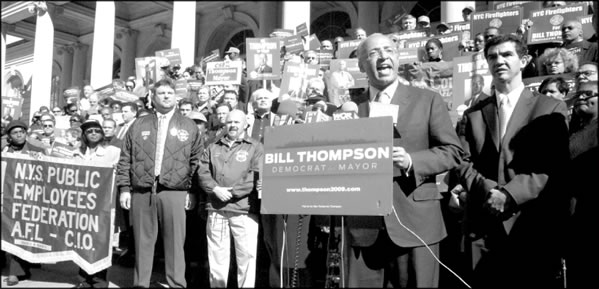By Josh Rogers
A Mayor Thompson would have a simple message if his police commissioner warned him to keep Park Row closed for security purposes: Open it.
“I’m going to say ‘you know something, I still have yet to understand …in reopening [the street], how that creates that unsafe situation for Police Plaza, and I think that a number of us don’t agree with that assessment and we need to reopen Park Row,’” Bill Thompson, the Democratic Party’s mayoral nominee, told Downtown Express last Thursday during an hour-long interview with Community Media L.L.C. papers.
The street, a main thoroughfare connecting Chinatown with the rest of Lower Manhattan, has been closed to almost all traffic since 9/11 because it runs near police headquarters. The closure was the subject of neighborhood lawsuits, which contended other nearby roadways such as Brooklyn Bridge exit ramps have remained open, while the Park Row closure hurts Chinatown businesses and has disupted residents’ lives.
A state judge ruled five years ago that police illegally took over park space as part of the closure and has criticized police tactics with residents, but he denied motions to reopen the street.
Thompson’s Republican opponent, Mayor Mike Bloomberg, has deferred decisions on the street to Police Commissioner Ray Kelly, who maintains it needs to remain closed. They did allow city buses to run on the street a few years ago.
Thompson, 56, the city’s comptroller, criticized the mayor for not consulting enough with the community on many issues, often to the detriment of small businesses, he said. The city’s plan to change the traffic pattern at Chatham Square, which connects with Park Row, will hurt businesses, Thompson said.
“There are people who looked at the design and said this is going to kill us, this isn’t good,” he said. “You look at Park Row — the community’s sitting there and has been saying for years, ‘could you please open Park Row up because we’re cut off and it is doing damage to businesses,’ and the city ignores it.”
The closure and the Chatham Square plan have overwhelming opposition on Community Boards 1 and 3, but Thompson doesn’t always accept community board conclusions.
NY1 reported a few weeks ago that Thompson promised to rip up the Grand St. bike lane. The lane, which cuts through Soho and Chinatown, has been criticized by some residents and businesses, and originally did not have enough room for fire trucks to turn onto it.
But it received strong support from Community Board 2. According to Dept. of Transportation statistics, accidents of all types are down by nearly 30 percent on Grand St., but Thompson said those were not enough reasons to keep the lane.
“Then you move forward,” Thompson told the Express. “So you’ll have a safer street where the businesses are going to wind up closing? That’s not what you’re looking to do. You’re looking to strike that balance so it works.”
He said last week that he would have his transportation commissioner take a new look at any lanes that seemed to be problematic, such as along Grand St. and in Astoria, though he did not promise to definitely close any. He favors bike lanes and suspects ones on wider streets such as on Eighth and Ninth Aves. are working better.
Bloomberg, in an interview the next day, cited the expansion of bike lanes as one of many things that have gotten better under his leadership.
On the World Trade Center site delays, Thompson does not accept the mayor’s explanation of having limited authority.
“You may not have as much jurisdiction — ask for it,” he said. “The City of New York has been passive and the mayor pops up occasionally for political purposes to try and say let’s have a dialogue … For years he did nothing. It really is a national disgrace that nothing has happened at the World Trade Center site — nothing substantial.”
There continues to be extensive construction on the W.T.C. memorial, train station and two office towers, but the long-term financing for the rest of the project is unknown as developer Larry Silverstein and the Port Authority, the site’s owner, are locked in an arbitration battle.
Thompson staked out a position similar to what the mayor did a few months ago: Get everyone to the negotiating table and ask them to put in more money including more financial help to Silverstein to keep building. Thompson agreed his view was like Bloomberg’s.
“Yes, except nothing has happened in the last eight years,” Thompson said.
He said Silverstein should not make any money on the deal, but he also sounded like he was willing to accept public financing of a private developer.
“The Port Authority has dollars,” he said. “It’s really a question of everybody saying this has to be done…..Do I want to pour massive amounts of public dollars in this? Not really,” but the W.T.C. “is a separate and special project.”
Josh@DowntownExpress.com

























